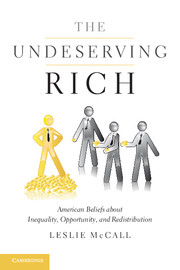Most contemporary research on economic inequality focuses on the causes, contours, and consequences of unequal distributions of resources. But how they do such distributions become legitimate? Why do people accept them, and even take them for granted? Why is it okay for some people to have a lot, while others have so little? Drawing on evidence from my recent study of wealthy New Yorkers, this essay takes up one understudied facet of the problem: the concept of entitlement, especially in relation to the affluent.
“I’ll suggest that to mark some entitlement as illegitimate actually creates a category of legitimately entitled people: those who don’t act entitled.”In the United States, “entitlement” is usually a dirty word. For the poor, it is associated with stigmatized welfare dependence. More broadly—but particularly for the rich—to be “entitled” is to believe you are more important and deserve more than other people, to imagine the rules don’t apply to you, and to be unaware of your own advantages. In this sense, which I focus on here, the term actually connotes a lack of deservingness. But this colloquial, negative usage refers only to illegitimate entitlement. In fact, I’ll suggest that to mark some entitlement as illegitimate actually creates a category of legitimately entitled people: those who don’t act entitled. Think, for example, of Warren Buffett’s legendary down-to-earth affect and lifestyle or Bill Gates’ enormous philanthropy—perhaps contrasted to Donald Trump’s fake charities, ostentatious lifestyle, and braggadocio.
Understanding entitlement rhetoric
To back up for a moment: we might expect that inequality would be morally problematic in the United States, which has a deeply egalitarian ethos. In fact, as Leslie McCall has recently demonstrated using survey data, Americans do have a more critical view of inequality than scholars have usually recognized. But, she asserts, Americans mostly care about inequality as it may affect equality of opportunity, a concept closely linked to the American Dream.1 Cambridge University Press, 2013More Info →
Cambridge University Press, 2013More Info →
McCall points out that Americans’ understandings of equal opportunity include aspects other than hard work, such as fair pay.
A central tenet of this culturally prominent and powerful ideology is its emphasis on hard work as leading to success. Crucial for my purposes here, the American Dream discourse not only suggests that hard work explains monetary success, but also that it legitimates such success morally. The notion of “meritocracy” implies not only that people are able to get ahead based on their hard work, but also that, if they do get ahead on that basis, they deserve the fruits of their labor.
Indeed, hard work as the bedrock of legitimate entitlement stands out in public discourses and policies about all kinds of entitlements. Poor people are cast as “undeserving” if they don’t work, in public opinion and in welfare policy.2See
→Martin Gilens, Why Americans Hate Welfare: Race, Media, and the Politics of Antipoverty Policy (University of Chicago Press, 1999).
→Michael Katz, The Undeserving Poor: America’s Enduring Confrontation with Poverty: Fully Updated and Revised (New York: Oxford University Press, 2013). Immigration advocates have often claimed that the hard work and economic contribution of immigrants are grounds for belonging even in the absence of citizenship.3See, e.g., Bloemraad, Voss, and Lee, “The Protests of 2006,” in Rallying for Immigrant Rights, ed. Irene Bloemraad and Kim Voss (University of California Press, 2011), pp. 3–43. And, of course, the idea that wealthy people work hard for their money is an argument for not taxing them further. In general, to have a strong work ethic emerges not only as a criterion for economic or political entitlement but also as a crucial measure of moral worth.4See
→Michèle Lamont, Money, Morals, and Manners (Chicago: University of Chicago Press, 1992).
→Michèle Lamont, The Dignity of Working Men (Cambridge: Harvard University Press, 2000).
Yet, despite producing a vast literature on Americans’ opinions about economic issues, scholars have rarely asked how advantaged people understand their own entitlement. Recent survey research has looked at the policy preferences of the top 1 percent,5Benjamin Paige, Larry Bartels, and Jason Seawright, “Democracy and the Policy Preferences of Wealthy Americans,” Perspectives on Politics 11, no. 1 (2013): 51–73. for example, and much research has looked at the social boundaries elites use to exclude others.6See, e.g.,
→Diana Kendall, The Power of Good Deeds: Privileged Women and the Social Reproduction of the Upper Class (Lanham, MD: Rowman and Littlefield, 2002).
→Jessica Holden Sherwood, Wealth, Whiteness, and the Matrix of Privilege: The View from the Country Club (Lanham, MD: Lexington Books, 2013).
→Michèle Lamont, Money, Morals, and Manners (University of Chicago Press, 1992).
→Lauren Rivera, Pedigree: How Elite Students Get Elite Jobs (Princeton: Princeton University Press, 2015). But, despite a long history of qualitative research on working-class people’s lived experience, few scholars have explored wealthy people’s experience at all, much less how they feel about their privilege.
This neglect doubtless stems in part from the well-documented difficulty of gaining access to elites, especially for in-depth conversations.7Benjamin Paige, Larry Bartels, and Jason Seawright, “Democracy and the Policy Preferences of Wealthy Americans,” Perspectives on Politics 11, no.1 (2013): 51–73. Substantively, scholars may also imagine that wealthy people are untroubled about their privilege, that it is somehow “natural” to be comfortable with being at the top of the heap. Such an assumption is supported by social psychology experiments suggesting that rich people are more unethical, more narcissistic, less generous, and generally less “prosocial” than others.8See
→Paul K. Piff, “Wealth and the Inflated Self: Class, Entitlement, and Narcissism,” Personality and Social Psychology Bulletin 40, no.1 (2014): 34–43.
→Paul K. Piff, Daniel M. Stancato, Stéphane Côté, Rodolfo Mendoza-Denton, and Dacher Keltner, “Higher Social Class Predicts Increased Unethical Behavior,” Proceedings of the National Academy of Sciences of the Unites States of America 109, no. 11 (2012): 4086–4091.
→Paul K.. Piff, Michael W. Krauss, Stéphane Côté, Bonnie Hayden Cheng, and Dacher Keltner, “Having Less, Giving More: The Influence of Social Class on Prosocial Behavior,” Journal of Personality and Social Psychology 99, no. 5 (2010): 771–784.
In fact, the few interview studies of the wealthy that have been done tend not to identify discomfort with inequality among respondents.9Susan Ostrander, Women of the Upper Class (Philadelphia: Temple University Press, 1984). See also
→Arlene Kaplan Daniels, Invisible Careers: Women Civic Leaders from the Volunteer World (Chicago: University of Chicago Press, 1988).
→Diana Kendall, The Power of Good Deeds: Privileged Women and the Social Reproduction of the Upper Class (Lanham, MD: Rowman and Littlefield, 2002). The wealthy women Susan Ostrander studied around 1980, for example, were quite complacent about their social advantages, even referring to themselves as “better” people than those in less elite communities.
But times have changed. As Shamus Khan has argued, meritocracy has displaced aristocracy as a criterion of legitimate privilege over the last few decades.10 Princeton: Princeton University Press, 2011More Info → Most recently, beginning with the economic crisis of 2008 and especially with the emergence of Occupy Wall Street in 2011, critiques of inequality and specifically of “the 1 percent” have become prominent in public discourse. Thus, elites who have come of age in this period may have a new set of feelings and discourses about their own privilege.
Princeton: Princeton University Press, 2011More Info → Most recently, beginning with the economic crisis of 2008 and especially with the emergence of Occupy Wall Street in 2011, critiques of inequality and specifically of “the 1 percent” have become prominent in public discourse. Thus, elites who have come of age in this period may have a new set of feelings and discourses about their own privilege.
Researching the 1 percent
To investigate the lived experience of affluence in this generation, I conducted fifty interviews with wealthy New York parents, mostly in their thirties and forties, in forty-two households. All were college-educated, and two-thirds held advanced degrees. With a few exceptions, these respondents were in the top 2 percent of income or wealth or both; most were in the top 1 percent; a few were in the top tenth of 1 percent. The median income of the sample was about $625,000; the median wealth about $3.25 million.11Some wealth figures are my conservative estimates, as I did not have complete data on assets. Earners in households supported primarily by earned wealth typically worked in finance, corporate law, or business. Those who lived on inherited wealth tended to work in the arts, nonprofits, and academia. Three-quarters of respondents were women; about one-fifth were people of color. They ranged from Republicans to people left of the Democratic Party, though most were socially liberal.12 I recruited respondents through snowball sampling. The sample is not representative of any wealthy population, however defined, in New York or elsewhere. See Sherman, Uneasy Street. I talked with them about how they made consumption and lifestyle decisions, such as choosing kids’ schools and buying and renovating their homes, and in the course of these conversations I got a sense of how they felt and talked about their privilege.
As it turned out, my affluent respondents were quite aware of and often uncomfortable with their advantages over others. They wanted to be worthy of their privilege and were anxious not to be “entitled.” As we might expect, avoiding entitlement meant working hard. Those with highly paid, demanding jobs emphasized this labor. Even stay-at-home mothers and inheritors of wealth represented themselves as productive workers, explicitly resisting the “rich dilettante” stereotype.
“They strongly distinguished themselves from the materialistic, ostentatious spending often associated in the public mind with the rich.”But hard work was not the only dimension of meritocracy. Another critical aspect was reasonable consumption. My respondents repeatedly emphasized that they spent prudently, buying basics for their children and families rather than extravagances for themselves. They often described snagging bargains, but they never bragged about spending a lot. They strongly distinguished themselves from the materialistic, ostentatious spending often associated in the public mind with the rich.
In this way, they drew on the Protestant Ethic, which emphasizes discipline in consumption as well as in work. Prudent consumption thus emerges as another, though less frequently noted, dimension of meritocracy. Indeed, moral critiques of excess consumption are also directed at other “unworthies” such as the poor, including the iconic image of the “welfare queen” driving a Cadillac.
These New Yorkers also emphasized “giving back,” although they did this in different ways. Some gave away large amounts of money. Others—especially the stay-at-home mothers—volunteered, often at their children’s schools. For some, social responsibility took the more private form of being “aware” of their privilege and careful about how they talked about it with others. In fact, another criterion for deserving one’s advantages was not to mention them. My respondents thought discussing money with anyone, but especially with those who had less, was rude. They also claimed to treat other people well regardless of their class position.
Finally, to be worthy of one’s advantages meant to raise “good people”—children who were themselves not “entitled.” My interviewees wanted their children to be hard workers, rather than “lazy jerks,” in the words of one man with over $50 million in inherited wealth. Parents tried to limit children’s consumption and their consumer desires and expectations. They hoped to ensure that kids were “aware” of their privilege and to “expose” them to those with less, and they wanted to make sure they treated all others with respect and reciprocity. Although parents across class doubtless share some of these concerns, wealthy parents are ultimately preparing their children to occupy their class entitlements appropriately rather than challenging these in any way.13Sherman, “Conflicted Cultivation: Parenting, Privilege, and Moral Worth in Wealthy New York Families,” American Journal of Cultural Sociology 5, no. 1 (2017).
It is hard to evaluate whether these respondents “truly” worked hard or consumed reasonably, since these concepts are relative. But what matters for my purposes is their desire to see themselves as hard workers and reasonable consumers who give back. These emphases also helped these parents cast themselves as “normal.” They used this word often, usually to signal a lack of excess in their lifestyles. In these ways, my respondents frame themselves as part of the morally worthy American middle-class, downplaying their elite status and distancing themselves from the images of lazy over-consumers that attach to both rich and poor.
These requirements of legitimate entitlement are not limited to these affluent New Yorkers. For example, social norms that proscribe talk of money and require equal treatment of everyone (the Golden Rule) are taken for granted in the United States; such norms ultimately silence and deny class difference. More specific to the rich, to have earned wealth oneself, to work hard, to eschew ostentation, to give back while keeping quiet, and in general to seem “normal” are all ways in which having wealth is legitimated broadly in American public discourse.
Conclusion
“These ideas about the legitimate entitlement of individuals have important implications for legitimating inequality more generally.” These ideas about the legitimate entitlement of individuals have important implications for legitimating inequality more generally, because making moral judgments of individual behaviors distracts us from any possibility of thinking about redistribution. First, such judgments reproduce evaluations of the legitimacy of wealth as an individual-level enterprise rather than having anything to do with systematic ways in which resources are unequally distributed. To judge wealthy people in these moral terms is analogous to judging poor people on the basis of their behavior—both tend to naturalize inequalities that are actually a function of social systems and structures.Second, these legitimate entitlements have primarily to do with affect and behavior. As one stay-at-home mom with a household income of about $1 million put it, “entitlement” is a “feeling that you deserve it, because you were born into it, or had the right education, and [that] it should be this way.” That is, what matters is what individuals do and how they feel, not what they have. If they don’t act entitled, they become entitled. A recent example of this logic appeared in a New York Times column by James B. Stewart in November, in which he argued that “no one resents” J. K. Rowling’s “success” because she worked for it and is generous philanthropically.
Finally, to make these distinctions at all reproduces a system in which being astronomically wealthy is acceptable as long as wealthy people are morally good. If there are “bad” rich people, there can be “good” rich people.
What would it mean, instead, to say that we should be critical of the fact that J. K. Rowling is a billionaire—regardless of how she came by her fortune, how she spends it, or whether she gives it away—solely on the basis of the idea that such wealth is inseparable from extreme inequality, which is both pernicious for society and itself immoral? To try to separate ideas about individual moral behavior from those about material entitlement would, at the very least, shed light on deep cultural ambivalence about legitimate entitlement. At most, it could remove one of the cultural pillars that supports a radically unequal distribution of resources.
References:
 Cambridge University Press, 2013More Info →
Cambridge University Press, 2013More Info →McCall points out that Americans’ understandings of equal opportunity include aspects other than hard work, such as fair pay.
→Martin Gilens, Why Americans Hate Welfare: Race, Media, and the Politics of Antipoverty Policy (University of Chicago Press, 1999).
→Michael Katz, The Undeserving Poor: America’s Enduring Confrontation with Poverty: Fully Updated and Revised (New York: Oxford University Press, 2013).
→Michèle Lamont, Money, Morals, and Manners (Chicago: University of Chicago Press, 1992).
→Michèle Lamont, The Dignity of Working Men (Cambridge: Harvard University Press, 2000).
→Diana Kendall, The Power of Good Deeds: Privileged Women and the Social Reproduction of the Upper Class (Lanham, MD: Rowman and Littlefield, 2002).
→Jessica Holden Sherwood, Wealth, Whiteness, and the Matrix of Privilege: The View from the Country Club (Lanham, MD: Lexington Books, 2013).
→Michèle Lamont, Money, Morals, and Manners (University of Chicago Press, 1992).
→Lauren Rivera, Pedigree: How Elite Students Get Elite Jobs (Princeton: Princeton University Press, 2015).
→Paul K. Piff, “Wealth and the Inflated Self: Class, Entitlement, and Narcissism,” Personality and Social Psychology Bulletin 40, no.1 (2014): 34–43.
→Paul K. Piff, Daniel M. Stancato, Stéphane Côté, Rodolfo Mendoza-Denton, and Dacher Keltner, “Higher Social Class Predicts Increased Unethical Behavior,” Proceedings of the National Academy of Sciences of the Unites States of America 109, no. 11 (2012): 4086–4091.
→Paul K.. Piff, Michael W. Krauss, Stéphane Côté, Bonnie Hayden Cheng, and Dacher Keltner, “Having Less, Giving More: The Influence of Social Class on Prosocial Behavior,” Journal of Personality and Social Psychology 99, no. 5 (2010): 771–784.
→Arlene Kaplan Daniels, Invisible Careers: Women Civic Leaders from the Volunteer World (Chicago: University of Chicago Press, 1988).
→Diana Kendall, The Power of Good Deeds: Privileged Women and the Social Reproduction of the Upper Class (Lanham, MD: Rowman and Littlefield, 2002).















Comments are closed.